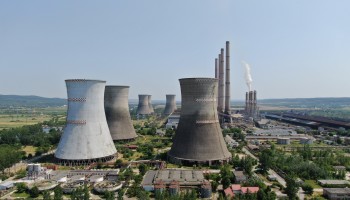Meanwhile, government officials are licensing new energy traders, privatizing state resources and liberalizing the energy market, but the pace of the market changes means it could be years, if ever, before consumers feel any benefit from those new policies meant to bring competition.
Nuclear Chain Reaction
Bulgarian consumers have long benefited from cheap electricity. The country invested heavily in power plants including the large six generator nuclear plant in Kozludui. Bulgaria was energy rich and used its wealth to sell extra power to its neighbors in a energy poor region. Bulgaria along with Bosnia-Herzegovina and Romania are the only countries in southeast Europe that regularly export energy. Over the last decade, Bulgaria has covered 50 to 90 percent of the shortfall of its neighbors, especially Greece and Serbia . Bulgaria Losing Power
Bulgaria Losing Power
The fate of Bulgaria 's energy surplus was sealed in 1999 when the Bulgarian government agreed with the EU to shut down the four of six reactors at Kozlodui located 125 miles north of Sofia . The agreement was made a condition of Bulgaria getting into the EU. The EU said the old Soviet-designed reactors are dangerous.
The first two 440 MW reactors were shut down in 2002. By the end of this year, two others are scheduled to close and the plant will be left with two 1000 MW reactors of a more modern design although even those reactors have had problems. In October, a leak in a heating device led to the release of radioactive liquids at the plant. Management said that the contamination was contained in the piping and no workers were affected.
To replace the lost energy, Bulgaria recently restarted work on a second nuclear reactor in Belene that had been stopped in 1992 after coming under pressure from environmentalists but that plant is still years away from completion.
The Kozludui nuclear plant is by far Bulgaria 's largest generator of electricity, and shutting down reactors means the country will likely go from a net exporter to a net importer of energy within the year. A chain reaction from those closures is likely to affect people in other countries around the region short of power. Energy prices will rise.
Bulgaria may even have to import more expensive power in a region already desperate to replace the shortfall caused by the Kozlodui closures.
The closure will have a fallout that will contaminate the economy. According to the Bulgarian ministry of energy , the country could lose €575 million to €734 million over 25 years. Other analysts have called those numbers too low.
Bulgaria has been selling about 7.5 billion kilowatt hours to its neighbors through the state power company NEK. Exports have been growing by double digits some years. Half of the electricity goes to Greece , another third to Serbia , and the rest to Romania and Macedonia .
The reduction in revenue will also hurt NEK's ability to modernize the remaining two reactors. NEK has spent $350 million modernizing the two reactors that are being closed and company officials feel their closure is unnecessary.
To deal with anticipated shortages, they say the company will not export electricity during winter, when need is highest. While it can export in the summer, demand from neighboring countries is lower then.
The consumer
On the other side of the equation, energy usage in Bulgaria is rising steadily. Businesses are investing in growing and modernizing their facilities with new equipment, and families with more disposable income are buying more electric appliances.
None of this is good news for consumers, an increasing number of whom will not be able to afford electricity. One in seven here lives in poverty and after food and housing, energy already is their biggest expense. (see story on energy riots) Oddly, the price rise adopted by the regulatory agency in October will disproportionately affect the poor but high energy users will actually see a price drop. The regulatory agency adopted a flat rate of BGN 0.146 per KWh. In the old system, the first 75 KWh cost only 0.098. Rates after 75 KWh were 0.174. Prices for users of less than 75 KWh per month, about 20 percent of the population, will see prices double.
| Prices in Bulgarian Lev | Energy cost for 75 KWh | Energy cost for 150 KWh | Energy cost for 225 KWh |
| Old rate | 7.35 | 20.4 | 33.45 |
| New rate | 10.95 | 21.9 | 32.85 |
| Change | +49% | +7% | -2% |
An export by assault
Privatization that is supposed to improve efficiency is at least in the short term leading to higher prices. As with all countries that signed the Athens memorandum, Bulgaria agreed to separate its state companies into a company that generates electricity (currently NEK), companies that distribute energy and companies that oversee the transmission of electricity (called an ISO).
In 2004, Bulgaria aggressively privatized parts of its state energy system. Three foreign companies, CEZ from the Czech Republic, E.ON of Germany and Austria's EVN , are now majority owners of the seven former public electricity supply and distribution companies, having taken over 13,000 employees and 4 million consumers. Those consumers were promised the privatization would lead to greater efficiency and lower prices. But so far, that has not been the case.
The three have already announced plans to increase prices. The companies say the price hikes are necessary to make a profit and to modernize equipment.
CEZ, which operates the joint electricity supply and distribution companies in Sofia and Pleven, proposed a 12 percent price rise starting October 1, 2006 to the State Energy and Water Regulatory Commission but was rejected in favor of the 1.8 percent increase for residents. They have developed an investment plan worth €164 million they say meets EU requirements. They were allowed a 16.5 percent increase in the price they could charge businesses who buy electricity.
German E.ON, the majority owner of the electricity supply and distribution companies in Varna and Gorna Oriahovitza, wanted the same increase but will get the same with 15.9 percent on businesses. In 2005 E.ON’s Bulgarian company lost 15 million leva, company officials say.
EVN, which operates the Stara Zagora and Plovdiv networks, asked for an 8.5 percent increase for residents and businesses but was allowed 15.3 percent on businesses and the same 1.8 percent for residents.
Meanwhile, the Ministry of Economy and Energy is looking into whether EVN raised electricity bills without approval. The investigation of EVN’s billing system came about after residents in a number of cities complained about what they said were excessive bills.
Part of the appeal of the privatization was the money earned by the state. The deals, valued at €693 million, went to pay off a significant portion of NEK’s debt to the state. For example, E.ON alone paid 50 million leva of NEK’s old liabilities to the state budget. At the time, this allowed NEK to not raise electricity prices to pay its debts.
In the first six months after privatization, the electricity supply and distribution companies increased their profits from 8 million to 18.2 million leva. The new owners came into conflict with the State Energy and Water Regulatory Commission, because they insisted on a 15 to 20 percent rise in the price of electricity and new subscription fees. The commission regularly rejected these requests.
Under terms of the contracts they’ve been given, the firms were owed a 16 percent return of investment for the first three months, and 12 percent after that. Prior to the privatization, losses of these companies were 20 to 28 percent.
On April 18, NEK asked for a 15 percent price increase for electricity provided to the distribution companies staring in the middle of 2006 with a second rise at the end of the year. The company also insisted on a 20 to 30 percent increase in the transmission fee in order to compensate for the harsh drop in income that will come next year. Besides that, they intend to raise their selling prices towards electricity supply and distribution companies. The regulatory commission has not acted yet on this request but it if approved, those increases will likely get passed along to consumers and businesses as well.
The new owners of electricity supply and distribution companies in the country say they need considerably more solid price growth in order to secure their planned profits promised in their privatization contracts.





